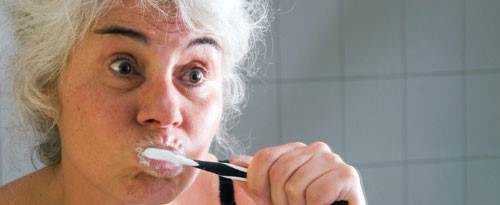Oral hygiene.

A clean mouth and teeth prevent mouth disorders, infections, and the growth of bacteria plaques. Illness and disease may cause care recipients to have a bad taste in their mouths. In addition, some drugs have an effect on mouth odors. For these reasons, oral hygiene is important for the care recipient. It is important to the care recipient’s well-being and makes food taste better. A person’s food and fluid intake will be influenced by the condition of the mouth. Oral hygiene should be given every morning and after each meal. Some care recipients will require little help with oral hygiene. Others will need the family caregiver to perform the entire procedure.
No matter how much assistance is needed, the following should be reported to the care recipient’s dentist or physician:
- Dry, cracked, or blistered lips.
- Redness, irritation, sores, or white patches in the mouth or on the tongue.
- Bleeding, swelling, or extreme redness to the gums.
Care recipients will have their own preference for toothpaste, mouthwash, and denture cleanser. Be sure to ask them what they prefer. Many microorganisms are found in the mouth. Gloves can prevent the spread of infections. In general, gloves should be worn when doing any mouth care and when handling dentures. Dentures need to be cleaned as often as natural teeth. When wet, dentures are slippery. They can easily break and chip. For these reasons, take special care when handling dentures. When they are not worn, they should be stored in a container filled with cool water. Dentures will dry out and warp if not stored in a liquid. Don’t ignore the care recipient’s mouth when you remove dentures for cleaning. The mouth needs to be cleaned with a soft toothbrush or to be rinsed with mouthwash.
Good mouth care is valuable to the health and well-being of everyone, but it is especially important to the health and well-being of the elderly and persons with mental illness or mental retardation.
As a person ages, soft tissues of the teeth tend to harden. Pain perception is reduced so it is more difficult to detect painful toothaches. Gum tissue recedes from around the teeth and oral membranes become pale and dry. Aside from dental problems, older adults are more prone to problems with the gums, salivary glands, lips, muscles, and jawbones. Tobacco smoke, food pigments, and saliva salts cause discoloration of teeth that cannot be removed by surface cleaning. Be aware that the amount of saliva (which cleans teeth) decreases with age, leaving the mouth more vulnerable to tooth decay and infection. Pair that with the inability to brush and floss, and the risk soars.
Good oral hygiene prevents sores and bad breath and keeps mucous membranes from becoming dry and cracked. Poor oral hygiene can contribute to poor appetite, leading to weight loss and malnutrition. Poor oral hygiene is also associated with the development of pneumonia in older adults. It is extremely important that you encourage clients to brush their teeth daily, especially at bedtime.
Regular brushing and flossing can prevent decay and mouth disease, improve blood flow and enhance appetite. Additionally, the individual will look and feel better. Dentures also need regular care to ensure a healthy mouth and should be checked regularly for proper fit. Dentures should be cleaned at least once a day to prevent staining, bad breath, and gum irritation. If you assist a client with oral hygiene, examine the mouth on a regular basis for signs of redness, swelling or bleeding. A dentist should check any red or white spots or sores that bleed and do not go away within two weeks. Regular teeth brushing will also prevent bad breath making it more pleasant for friends, family, and other people to be around the client.
ORAL HYGIENE (mouth care) is an important part of personal care. Oral care is important for several reasons:
- The client looks and feels better with clean teeth.
- Food tastes better and appetite improves.
- Cavities and infections are avoided.
- Bad breath is prevented.
Check the care plan to see if the client needs help with oral care.
Wear gloves if you assist with mouth care (Body fluid protection)
Equipment:
- A cup of water and straw, if necessary
- Toothbrush and toothpaste
- Basin or bowl “spit basin”
- Mouth, if desired
- Towel
- Disposable gloves
Steps:
- Gather equipment,
- Wash hands and put on gloves.
- Prepare the client: Talk about what you are doing. Have them sit up in a chair or at the bedside.
- Put a towel across their chest.
- Place all equipment within reach so the client can brush his or her own teeth.
- If you brush the client’s teeth, use firm, up and down short strokes in the front. On the sides use in and out strokes.
- Brush across the tops of the teeth.
- Be sure to scrub all surfaces.
- Allow the client to rinse with water or mouthwash, as preferred. Clean up the area and put away all equipment.
- Discard used gloves.
- Wash hands.